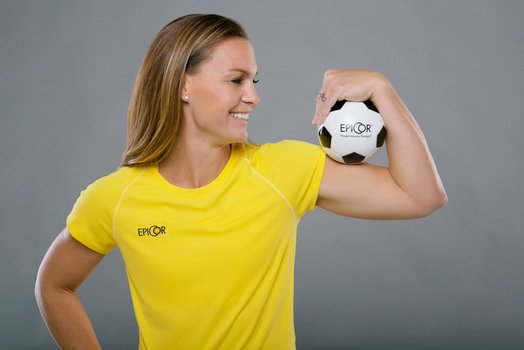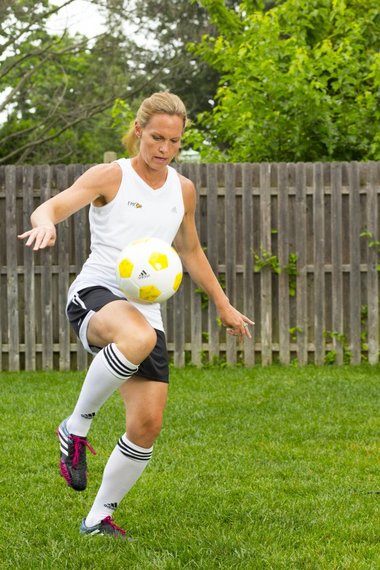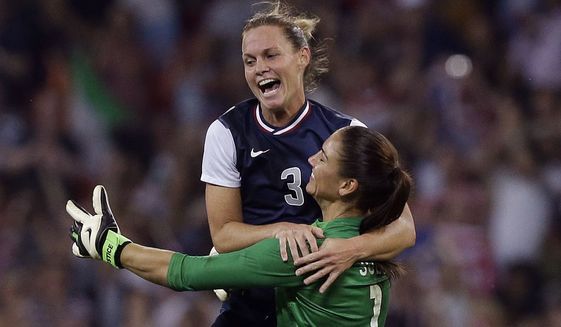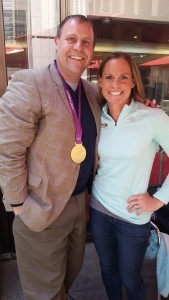We sat down with the three-time Olympic gold medal winner and talked about navigating a career and parenthood, youth sports, health and fitness, women's sports and her incredible 19-year run as a key cog on team U.S.A.
____
Christie Rampone's bio speaks for itself. She is a super duper star. But sitting across from her at an outdoor cafe in New York City, you wouldn't know it. She is warm and down to earth, eminently relatable and easy to talk with. Despite her elite status, the challenges she has faced are ones that will sound familiar to many. Indeed, she and her husband Chris are navigating the same issues that so many parents are.
Now, about that bio that speaks for itself...
Christie Rampone has had an incredible career that has landed her in the very upper echelon of women's soccer players in the world. Recognized as the best defender in the world of women's soccer, Christie has earned 304 caps -- making her 2nd all-time on the Women's National Soccer Team in international appearances and the ninth player as the USWNT team captain.
Rampone is the captain of the U.S. Women's National Soccer Team and as the first four-time Olympian in the history of the squad is heading to her fifth FIFA Women's World Cup next month. Along with her friends and teammates, she guided her team to Olympic Gold Medals in 2004, 2008 and 2012 and was a member of the 1999 Women's World Cup Team that captured the heart of our Nation.
She is also the 39-year-old mother of Rylie (10) and Reece (5). She and her husband, Chris, are actively navigating parenting -- where he spends time at home with the kids while Christie works.
Christie has also overcome many obstacles to being and staying an elite athlete along the way. This includes an uphill battle in the world of women's sports to make playing soccer a sustainable career, two pregnancies, and a bout with Lyme disease as well as several autoimmune diseases.
She has stayed at the top of her game with a level attitude, hard work, and dedication to eating healthy, staying fit and strengthening her immune system.
We're thrilled to present our conversation with Christie Rampone, as well some additional thoughts from her husband, Chris.
Growing Up and Youth Sports
A fellow New Jersey native, Christie grew up in Point Pleasant, NJ in a "traditional" family setting: Her Dad worked and her Mom stayed home and shuttled the kids around. Rampone's dad was a school teacher and coach, and a huge influence in her life. He had been a scholarship college athlete in baseball, and Rampone latched on to his passion for competitive sports, ultimately focusing on an athletic scholarship as a goal of hers.
Christie and her siblings were involved in sports, including basketball, field hockey, track and soccer. Basketball was her main sport growing up, and soccer was more of something she "played for fun;" throughout high school, she was a better basketball player than soccer player. Incredibly, Rampone didn't focus on soccer as THE sport until she was asked to be on the team U.S.A. national team.
A self-described "late bloomer," she is a big believer in playing multiple sports as a kid:
These days so many kids are stressed because they have to choose one sport. As a mom, I'm definitely not going to specialize my kids. Riley (9) plays soccer and basketball, did gymnastics for a little while, and now has a passion for dance.
I want to make sure she picks what she wants to do, rather than me knowing best and picking for her. With both of our daughters, we are letting them try different sports to see what they love rather than just following mom's footsteps and playing soccer because mom played it.
As to whether her own kids feel pressure because of who she is, Rampone said she thought they did a little bit, but said most of that arises from the expectations and attitude of adults, not the children. In a refrain familiar to those of us involved in youth sports, she explained, "Unfortunately, it's the parents," and that vibe can trickle down and influence the kids. In terms of critiquing her own kids on the sports field, her attitude is laid back and quiet:
If she asks me, I'll tell her. Do you want the 'mom's version' or the 'coaches version?' I want to be honest. Because that's what my dad did with me. He would tell me my strengths and my weaknesses.
I always got that constructive criticism early on, so now I can take it from coaches. For now, my main message is to make sure you are working hard for your team, because it's a team sport. Don't put the pouty face on or stop running because you missed a shot.
The lessons she tries to teach are the lessons that cross-over from sports to life, like focusing on having good energy and body language -- things that Rampone thinks make a huge difference on the field and off it.
♦◊♦
Experience for the U.S.A. Women's National Team and Olympics
Growing up, you dream about going to the Olympics. But it's something you never think is really attainable. So when you get there it is just shocking.
Rampone describes the experience of sitting in the dining hall in the Olympic Village in her gear, surrounded by athletes from every sport and from every nation, wondering who someone is and then going up and talking to them.
Her best memory is of the Opening Ceremonies in 2000, the only Opening Ceremony she was able to participate in due to the playing schedule:
It's a moment when you realize the magnitude of what it is. It's like 'wow.' There are so many athletes, all struggling and working just as hard to get to the Olympics. And you realize how amazing that is.
She has been long-time friends with teammates Abby Wambach and Shannon Boxx as her "go to" buddies, having been through so much together over so many years. She's also starting to get to know Syd Leroux, a rising young star, and to be a support and mentor for her.
♦◊♦
On The Game of Women's Soccer
When Rampone first got started, she didn't view pro soccer as a long-term career, because there really was no women's soccer. The U.S.A. Women's National Team won the gold medal in 1996, and it wasn't even televised. Women's soccer players were barely even getting paid.
This is an area that has changed tremendously, and Rampone has lived that change.
When she joined the team in 1997, earning a nominal salary and playing at small stadiums. Leading up to the incredible 1999 World Cup victory, the Women's World Cup Committee realized that this team may be special and promoted the sport in ways they had not previously been done.
There were struggles along the way, including having to go on strike twice over pay issues. Though they had a great product, "There is only so long you can do it when you don't make money. It doesn't work if you can't live off what you're making, and there is no time to get another job -- I waitressed, worked on the board walk, cleaned rooms -- or to build a career." Eventually, women players started making more money and were able to sustain and grow the sport:
We're still fighting and pushing that battle, but as females it is something you need to do, even through it's uncomfortable.
The women's soccer game and its evolution is somewhat unique. This is a country where soccer is an evolving taste. The success of the team, winning multiple championships and Olympic golds, dwarfs that of the US Men's Team. There are parallels from the sports world to the real world with the Lean In movement and the push in boardrooms and corporate America for equal pay and equal opportunities for women. Despite their success and the progress that has been made, progress has been slow. Sports is still perceived as a traditional male/masculine arena:
In soccer, we'd love to get equal pay, but realistically we don't bring in the same amount of money as the men do. Even though we're more successful, they still have more fans and more sponsorship money...
People don't support the sport or see it as a 'true sport' in the same way as going to a male sporting event... It's hard to get fans to recognize, 'Oh yeah, women *can* play'. But once we get them to a game and they see, they're usually a fan for life."
She acknowledged that there are differences due to differences between the sexes in terms of size and speed and power that make the women's and men's games have different appeal to different types of fans. As anyone who has watched team U.S.A. play can attest, the women's game is exciting and chock full of dynamic talented players. As compared to the men's game, however, the women's game is more tactical, more based on pressure: "Some fans want to see the dunks, the one v. ones, and in soccer -- the wow moment goals. Our game takes a different kind of fan."
♦◊♦
Balancing Motherhood and Soccer and Being a Working Mom
Rampone came from a traditional family, but is now in a role where her husband is home as the primary caretaker.
The two discussed and agreed early on that her husband, Chris, who was a sales executive as CareerBuilder, would take a back seat in his career and stay home with the kids in order to let Christie pursue hers: "It's really about communicating and planning ahead."
She describes Chris as a bit more of "the fun one" while she remains the "discipline one," but of course, these aren't strict roles. Though they sometimes differ on parenting styles, they make it work, go with the flow and don't sweat the small stuff.
Being on the road with a family isn't always easy; there are times when Christie has returned to her family, exhausted after a practice or game, to find them crammed in a hotel room -- a scenario that may work as a platform for comedy on Modern Family, but which in reality is far more trying. With a lot of time on the road, they also make sure to have one-on-one time with each of the girls.
Inside Look: Q & A with Christie's Husband, Chris Rampone
GMPSports:
What is it like being the husband of a world-class female athlete?
Chris:
I think it's like being married to any successful professional female figure. You are proud of their accomplishments and success. And you marvel at what they're able to do especially while being a mom, wife and leader for their peers.
♦◊♦
GMPSports:
Do you think athletes have a responsibility to be good role models, more so than average folks? And do you think there are different pressures on female athletes than on male ones?
Chris:
No. I think we have gotten away from that. Athletes are human beings and they make mistakes. Hopefully, parents do a good job communicating with their kids about what makes a good role model. Absolutely. Female athletes in all sports are trying to show the world that they can compete like men or better.
♦◊♦
GMPSports:
How did/do you negotiate parenting responsibilities (and does that change for in-season vs. off-season)? Same question for household responsibilities/tasks (e.g., cleaning)? How do each of you approach the family vs. job balance question?
Chris:
Responsibilities are shared between the two of us. We are always communicating about even the littlest things. It can be difficult with so much travel as a structured schedule has never been a part of our lives.
♦◊♦
Overcoming Obstacles
Rampone has overcome numerous obstacles over her career.
The lone hold-over from the 1999 World Cup Championship still on the National Team, her career has been marked by stellar leadership and consistent greatness.
Along the way, she gave birth twice and worked her way back to the level of a world-class elite athlete. (This is -- of course -- something male athletes don't have to deal with!)
Playing for 19 years, she has also dealt with her share of illnesses and injuries. She was diagnosed with Lyme disease three years ago, after the birth of her second child, Reece. Relieved that her postpartum sluggishness had a medical explanation, she began taking a natural supplement called EpiCor three years ago and it has done wonders for keeping her immune system strong and keeping her healthy. After learning about the product from a friend, she contacted the company and became an endorser for the brand in 2014.
Rampone describes how almost immediately, her coaches, trainers and teammates noticed and they "told me I looked 10 years younger and had a new pep in my step." Though she has moments of exhaustion, she feels tremendous balance.
I take EpiCor because it protects my immune system. Since I started taking it and then became a spokesperson, it has amazed me how many people do not think about immune strength.
We talk about eating right and fitness, and for me, this is another key component. Really, staying healthy is the key to life. Without being healthy I can't perform on the field or as a mother. I definitely believe my longevity has to do with the dietary changes I made after being diagnosed with some auto-immunes after giving birth to Reece in 2011. For example, I've gone gluten-free and have started to eat to my blood-type. A friend introduced me to the all-natural ingredient EpiCor that I take to help strengthen my immune system. I have taken EpiCor daily for the past three years and it has become a part of my daily routine of rest, recovery, working out and eating healthy.
Rampone also knows and listens to her body. For instance, as an older player, Rampone knows she has to rest more and give her body time to recover. She also works out for shorter bursts. And of course, like many, to her children she probably sounds like a broken record when she says "you are what you eat," all while focusing on the importance of making good food choices.
♦◊♦
Athletes As Role Models and Social Activists
Christie believes strongly in social activism, as long as an athlete is passionate about a cause he or she supports. But she draws a line between that and efforts at self-promotion.
She also acknowledges that there is pressure on athletes today, with social media and the intense press scrutiny, to sell themselves and put themselves out there.
Authenticity is where it's at:
"As long as you are passionate about the causes and doing activism for the right reasons, I support that. Your heart has to be in it. It can't be about money. Money isn't always where it's at. And I see both kinds of it. Self-promoting, I struggle with that. Don't speak it. Show it with your actions."
♦◊♦
So what's next for Christie Rampone? Where is she headed?
"I'm just living the dream right now. I know my age is a factor and I know people talk about my age. But I feel like I'm being productive on the field. So I'm going to continue as long as I can."
_______
By Michael Kasdan, Lead and Sr. Sports Editor, The Good Men Project.
This article originally appeared on The Good Men Project.
Yup. That is Christie's gold medal from the 2012 Olympic Games. (I had to give it back).
Photo Credits: Provided by Christie Rampone




